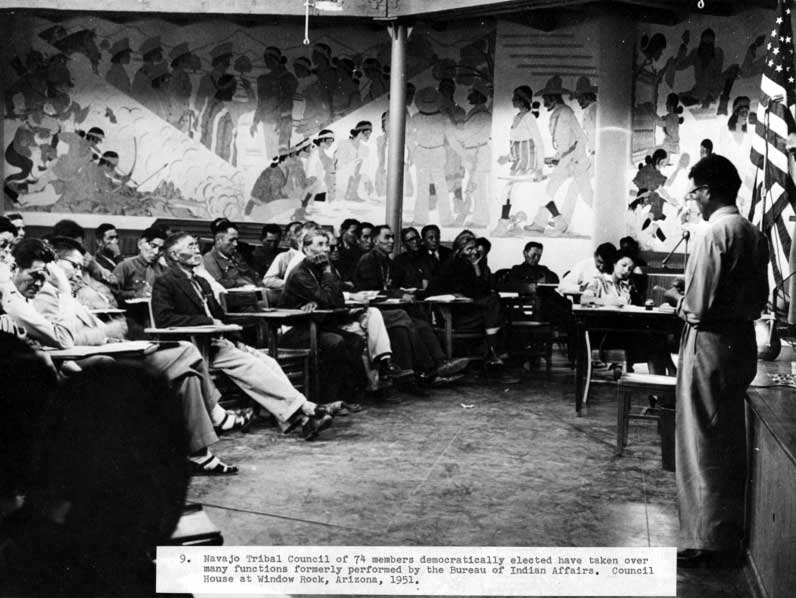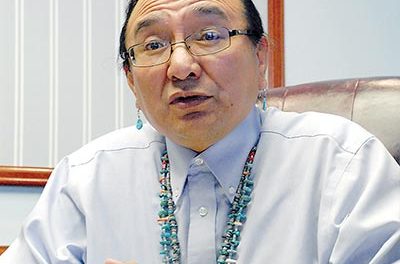
50 Years Ago: Nakai-Billison election heats up; Tribes get 25 cents a ton for coal

The Navajo Tribal Council originally consisted of 74 elected members who took over duties that had been performed by the Bureau of Indian Affairs. (Photo of Council in 1951 courtesy of Truman Library.)
The election for tribal chairman is beginning to heat up and at least one candidate for chairman has decided it’s time to take the gloves off.
Sam Billison, who lost to Nakai in 1962, has apparently began to realize that his opponent, the current chairman, Raymond Nakai, has a lot more support on the reservation than he thought at first.
Although the Navajo Times has no official figures, the paper is reporting that Nakai has more three or four times more political ads on the radio stations then Billison. And neither candidate appears to be spending any money on newspaper ads, taking their campaigns to elderly Navajos who don’t read the papers but listen to the radio stations that broadcast the news in Navajo.
Both campaigns are spending a lot of time going to chapter meetings and providing food and entertainment at rallies throughout the reservation and here again, according to the Times, the Nakai rallies seem to be larger than the ones Billison is sponsoring.
In his latest speeches, Billison is attacking Nakai for being a puppet of Interior Secretary Stewart Udall.
“Nakai is the first Navajo tribal chairman to try and lead his people right into the hands of one political party and make them a rubber stamp for anything ordered by Udall,” Billison said.
He added that he has been told that Udall will do anything to keep Nakai in power.
He pointed out that one of the planks of the Nakai campaign is support for the creation of a tribal constitution, something Billison pointed out the Interior Department has been trying to get the tribe to do for decades.
The Navajo people toyed with the idea of creating a tribal constitution back in the 1950s and decided against it when they realized that other tribes who adopted a constitution discovered too late that having a constitution “only gave greater power to the Interior Secretary” over tribal matters.
In other news this week in Navajo history, something happened that would be the subject of a great deal of discussion for the next 10 years.
The Navajo Tribal Council’s advisory committee approved an agreement with the Peabody Coal Company that would get the tribe 25 cents for every ton of coal the mining company took off the reservation.
Tribal officials expressed pride in making the agreement, saying it would provide the tribe some $75 million over the next 35 years.
That amounts to just over $2 million a year but even that was still up in the air because of a lawsuit filed by the Hopi Tribe demanding that half of that money be turned over to the Hopis because the land was part of the territory the two tribes were fighting over.
Because of that, the committee said half of that revenue would be put into escrow for the next seven years to see what happens in the lawsuit.
But the big controversy wasn’t with the Hopis but with the deal that Nakai made with Peabody.
As soon as he took office in 1971, the new chairman Peter MacDonald vowed he would get that agreement overturned because the tribe was getting what amounted to the price of a can of Coke for every ton of coal mined on the reservation.
He fought for several years and a new agreement was eventually signed that gave the tribe substantially more – 12 and a half percent of the value of the coal – which brought in millions of more dollars to the tribal coffers each year.
Also this week, an interesting trial began this week in Gallup over claims from a Navajo man that he was owed $155,000 from a group of companies that built the schools in Crownpoint.
Raymond Abeyta was a janitor at the schools until he was burned and totally disabled in an explosion that occurred at the school in 1961.
He was working at one of the teacherages when the explosion occurred during his attempt to light a water heater.
The teacherage received only minor damage but Abeyta was at the center of the explosion and received burns over most of his body. Abeyta blamed the construction companies for not completing work on the teacerages which set the stage for the explosion.
After a week-long trial in Gallup district court, Abeyta won his case but was awarded only $60,000 by the jury.
No reason was given for the reduced amount but attorneys for the various companies argued that Abeyta should share some of the blame for the accident because he did not take note of warning signs that there was a problem with the gas valves at the teacherages.
And finally, J.B. Tanner, an Indian trader who has a store in Yah-Ta-Hey announced that he had discovered a hot springs near his property.
The hot springs was the result of some drilling that was going on. The drilling, which went half a mile deep, hit a deposit of water unlike anything seen in the area, said Tanner.
Tests indicated that the daily capacity was 864,000 gallons with an unlimited supply available.
The water had a slight sulfur content and is at a constant temperature of 98 degrees, according to Tanner.
“After the water cools, it is perfectly satisfactory for drinking,” he said, adding that it requires no additional treatment.
Tanner was very optimistic that the discovery would have a great effect on the development of the Yah-Ta-Hey area, opening up possibilities of new businesses. He even suggested that Yah-Ta-Hey could become the new location for the Gallup Inter-Tribal Indian Ceremonial.
To read the full article, pick up your copy of the Navajo Times at your nearest newsstand Thursday mornings!
Are you a digital subscriber? Read the most recent three weeks of stories by logging in to your online account.







 Highway 264,
Highway 264, I-40, WB @ Winslow
I-40, WB @ Winslow